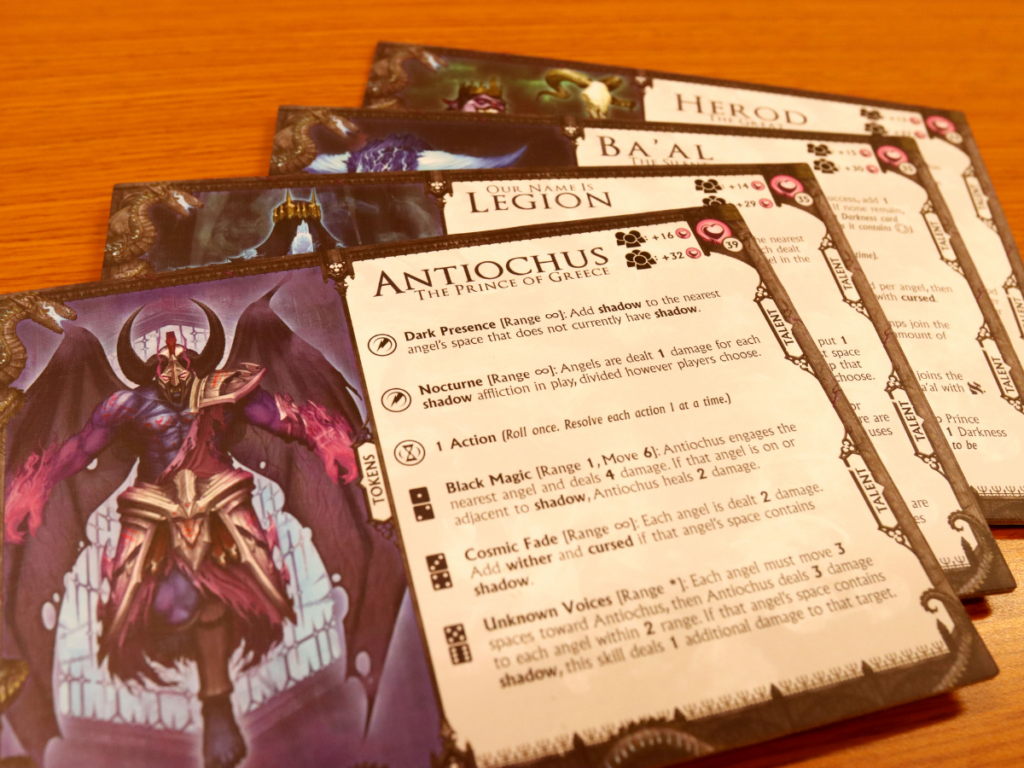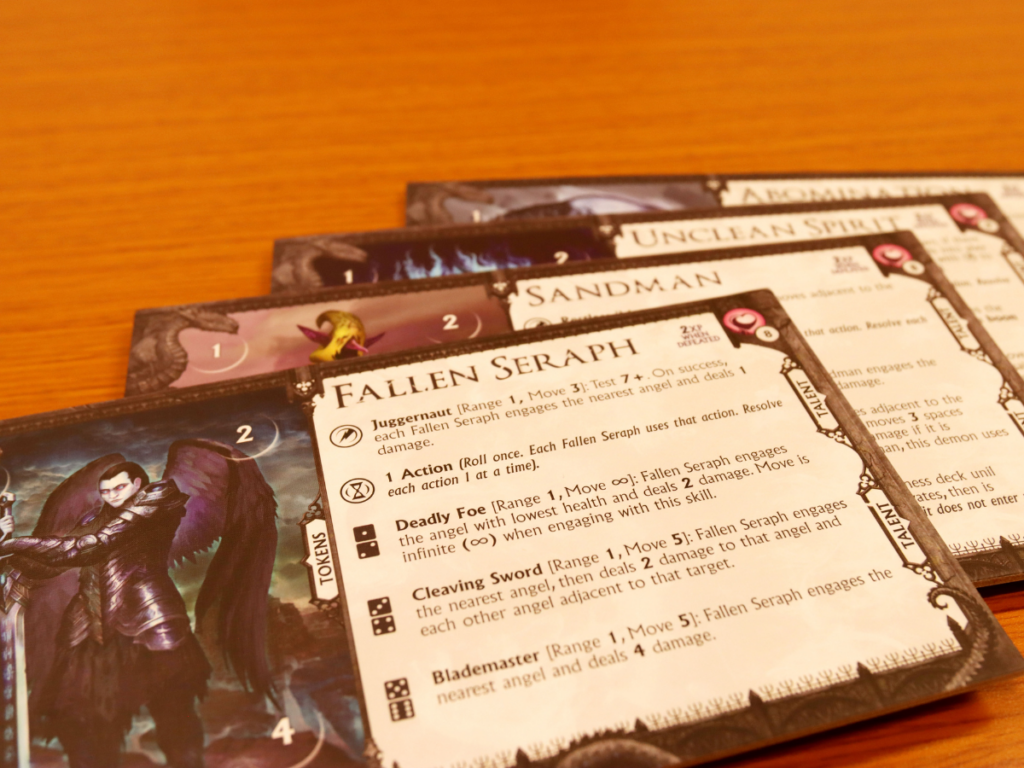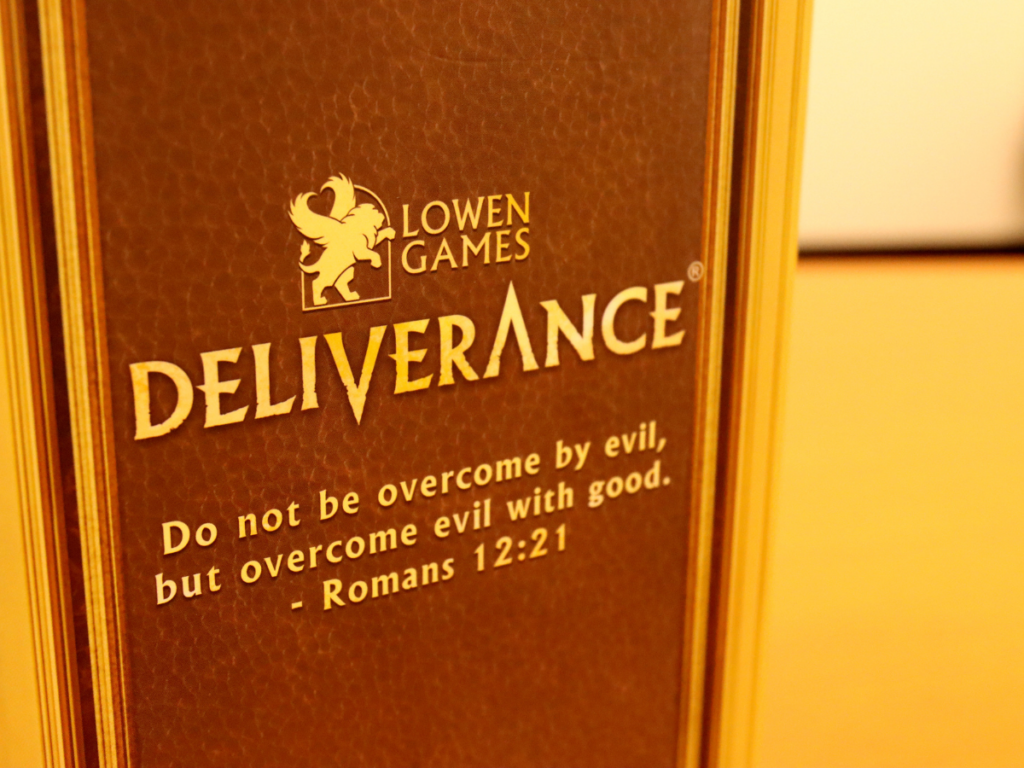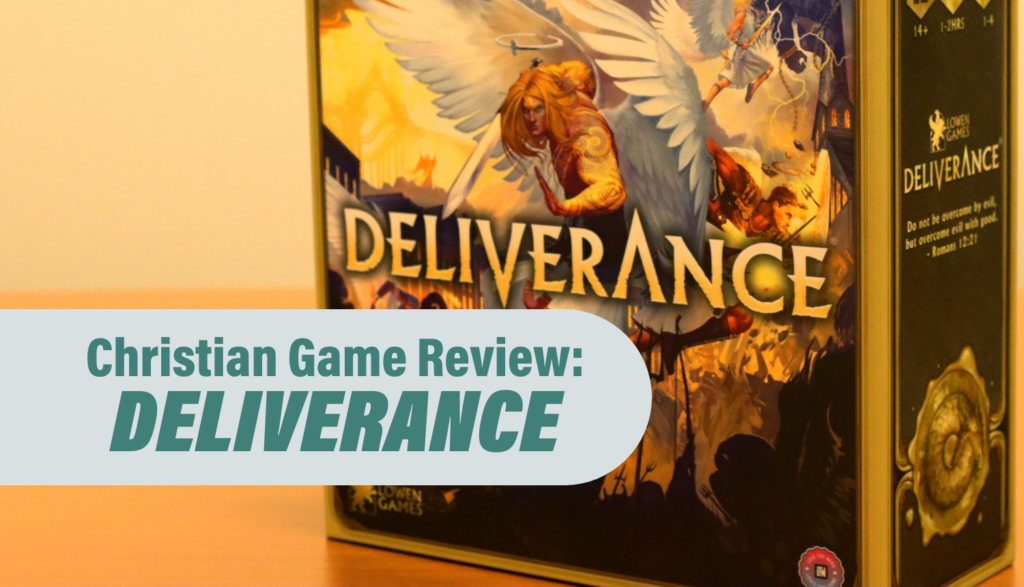Editor’s Note: We talk a lot in this blog about screen time and how technology can both bring families together and push them apart. But every now and then, we like to suggest possible alternatives to screen-based entertainment. And if it’s biblically based, all the better. But just as not every G-rated film is necessarily fit for your family, not every game is necessarily a great fit, either. Our reviewer and board game connoisseur, Kennedy Unthank, is taking a look at some Christian games over the next several weeks; we’ll periodically publish a review of a game on this blog to tell you all about it.
Introduction
“Now war arose in heaven, Michael and his angels fighting against the dragon. And the dragon and his angels fought back…” (Revelation 12:7).
Of course, that’s not the end of the sentence. But in Deliverance, it’ll be up to you to make sure that verse eight comes true: “But the dragon was defeated, and there was no longer any place for them in heaven.”
That’s because you and up to three of your mightiest friends play as angels engaged in that spiritual war. It’s not quite the one referenced in Revelation, but it’s a war that’ll certainly bring it to mind as you play. And until that Day of Wrath comes, it’s your job to protect the saints on Earth from the oppression of demonic spirits, sending the wicked creatures to the abyss where they will await the final judgment.
That’s why you’ve been sent to the town of Fallbrook. It’s so small a town that you have not yet deduced why such a large demonic presence exists there, but you and the rest of your heavenly host resolve to get to the bottom of it.
Deliverance depicts the spiritual warfare between angels and demons described in verses such as Daniel 10:12-14, Jude 1:9 and Revelation 12:7. The game is designed by Andrew Lowen, who is himself a Christian. It also stands as the publishing debut for Lowen Games, and it has become, according to the game’s PR, the “highest Christian crowdfunded board game of all time.” And according to the website for Deliverance, the game is Lowen’s attempt to “make an approachable and theologically sound fantasy game that was not preachy or sacrilegious.”
The box Deliverance comes in is huge. And as you might deduce, Deliverance carries a lot within it—and not just in physical pieces. This game displays a high level of detail from the moment you flip open the rulebook, from its gameplay mechanics to its exploration of Christian spirituality. We’ll dive into all of that in this review as we examine the game’s general play and how it handles its Christian setting. And, at the end, I’ll give some of my personal thoughts on Deliverance, too.
Note: Plugged In received a free copy of Deliverance for the purposes of this review.

Components
Upon opening the box, players will be greeted with a plethora of items. Aside from the rulebook and a campaign book, players will also be greeted with angelic player cards, each with their own powers, game lore, biblical inspiration and personal miniatures included. Likewise, demon princes and lesser demonic enemies have their own cards and inspirations, too. Game boards, status tokens, health and character trackers, dice, cards, standees and more round out the many, many items within Deliverance.

Gameplay
In Deliverance, players can choose between two styles of play: Campaign or Skirmish. In Campaign mode, players will utilize the story-driven module included with the game to set up specific battlefields that convey the general plot of the game. In Skirmish mode, players will fight against a wave of lesser demonic minions before they face off in a final battle against a demon prince and its army.
In either case, despite the size of its box, Deliverance is a relatively simple game. The main objective for players is to simply wipe out a group of demons. Players will also have what is sort of a side quest begging for their attention, as well—fighting to rescue and protect “oppressed saints.” And (other than because it’s a nice thing to do) players will likely want to do this because unprotected saints on the board will cause the players to accrue more and more “afflictions” in the form of Darkness cards, each with their own negative effect (more on those in a bit).
To accomplish your demon-slaying goal, players will choose from one of nine angels to play as, each with his or her own play style. They’ll use the actions available to them on their personal card to vanquish demons, and the demons will likewise strike back, hoping to send you and your angel army back to the Pearly Gates (an unfortunate but temporary setback in Deliverance, since angels can return to battle after being knocked out of play). Individually, you can be sent back to heaven and return to battle as many times as it takes, but if every angel is sent back before any angel can return to the battlefield, it’s game over for your gaming group.
Spiritual Elements
In a game of angels and demons, Christians are bound to have a lot of questions. No one wants to see their religious beliefs be misrepresented or mocked for the sake of a game.
But as you slide the cover of Deliverance’s game box off, it will quickly become apparent how much thoughtful consideration and attention to detail has gone into its design. For instance, Bible verses that relate to the concept of striving against evil are prominently displayed on each side of the box and throughout the game’s contents.
But, as you may have gathered from my description of the game thus far, this is a game that’s diving deeper than merely printing Bible verses on its components. So, let’s cover the biggest Christian elements in this game.

Prayer, Darkness and Heavenly Treasure Cards
We’ll start with the various cards a player will encounter on each playthrough.
There are many types of cards within this game, four of which are shown—with examples for the front and back of each card—in the image above. We’re going to focus on the first three in the image: Prayer, Heavenly Treasure and Darkness cards. Because they’re not inherently spiritual, we won’t be covering Talent cards, which serve as an upgrade to your (or your enemy’s) abilities.
According to the Deliverance website, “prayer is the angel’s answer to the Darkness, and neglecting it is likely to spell doom for your team.” In Deliverance, though all players will have their own unique abilities, each will have the ability to “pray” as one of their character actions, and, in doing so, gain a prayer card. These cards contain a verse from Scripture on their fronts, and each contains a helpful power on the other side that is related to the verse. Praying also has the ability to “cast down” accrued Darkness cards.
These Darkness cards are bad news, each with its own ability to impede your angel’s progress in some way—from damaging your health to decreasing your player stats. These cards will build up over the course of the game, and players must use the prayer action or prayer cards in order to cast them down. These Darkness cards have titles that relate to hidden sins, doubts or other things that might cause a believer to have their faith in God shaken, such as “Keeping Appearances,” “Seeds of Despair” or “Perilous Gambit.”
Contrasting Darkness cards are Heavenly Treasure cards. They’re boons that angels can obtain throughout a game to help them in their fight. They contain references to both literal and metaphysical things, concepts or themes that you’ll be able to find in the Bible (such as “Crown of Glory,” “Bronze Serpent” and “Sword of the Spirit”), as well as some other helpful items that come from other inspirations, such as “Winged Sandals.” A few of these cards come with penalties. For instance, various pieces of King Saul’s armor come with straight penalties along with their boons for equipping them, and the “Carpenter’s Burden Gloves” come with a damaging penalty if the angel doesn’t use a Pray action each turn while using them.

Angels
Of course, we can’t analyze the spiritual side of Deliverance without addressing the focal point of the game: a spiritual battle between angels and demons.
In the base game, players get to choose one of nine angels to play as, each with its own distinct cover art, powers and play style. (I should note that the game’s website has a detailed article explaining its depiction of its angelic figures—including why they’re depicted as humanoid, why they’re shown as both male and female and what Scriptures the company used for their inspiration. The game’s site says that the “angelic stances are specifically designed to point to their creator. They aren’t meant to bring the angels glory, but to glorify God.”)

On the backs of each angel card, players can read more about the specific angel they have chosen. The “Lore” section is filled with the game’s fantasy plot for the angel, while the “Inspiration” section reveals a Bible verse and facts that relate to how the angel was created for the game. For instance, the Bible never records any angel named Mikko who has authority over the waters, but it does record of an “angel of the waters” in Revelation 16:5, and we see other texts that tell of angels with some sort of authority over various elements elsewhere (Revelation 7:1 and 14:18, for instance).
Were we to cover each angel and its references in the Bible, we’d be here for some time. Instead, we’ve compiled a list of each angel in the game below with its respective title and verse reference.
- Gabriel – “Messenger of God” – Psalm 91:4, Luke 1, Daniel 9
- Michael – “The Archangel” – Psalm 144:1-2, Daniel 10:13, Jude 9, Revelation 12:7-9
- Uriel – “Flame of God” – Genesis 3:24, Revelation 14:18
- Mikko – “Riverwatcher” – Revelation 16:5
- Sardius – “Stonespeaker” – Ezekiel 28:13, Luke 19:40.
- Azrael – “Angel of Death” – Exodus 12:23, 2 Kings 19:32-35, Habakkuk 3:4-5, Hebrews 11:28
- Taolu – “Windwalker” – John 3:8, Revelation 7:1
- Christine – “Voice of Thunder” – Job 37:2-4, Revelation 14:6
- Shula – “Keeper of Light” – Isaiah 9:2

Demons
Just as Deliverance offers many angels, it also contains many demons. The strongest demons in this game are Fallen Princes, each of which is taken from a section of the Bible. Some of these are directly stated in Scripture to be demons, while others are inspired by various strange biblical references for the game. They include:
- Daeva – “The Prince of Persia” – Daniel 10:12-20
- Herod – “The Great” – Matthew 2:1-16
- Ba’al – “The Silent” – 1 Kings 18:20-25
- “Our Name Is Legion” – Mark 5:1-9
- Antiochus – “The Prince of Greece” – Daniel 11:30-38
- The Euphrates Frogs – Revelation 16:12-16

In addition, players will need to fight against other demons, too. While some of these demons come directly from the Bible, such as “Unclean Spirit,” others are taken from fantasy accounts. These lesser demons are:
- Fallen Seraph
- Abomination
- Unclean Spirit
- Sandman
- Meddling Imp
- Hateful Fiend
- Masked Evil
- Cruel Archer
As of now, Deliverance does not have an article on its site to explain its demons as it does with its angels. However, the publisher did supply us with this statement:
“The demons of Deliverance vary from biblically backed by Scripture to highly allegorical in nature. Much of this flavor is captured on the back of the demon character cards … However, even the fantasy expresses a kernel of truth, much like C.S. Lewis depicted within the demons of The Screwtape Letters. The minions of Deliverance illustrate how a lesser demon might attempt to antagonize or oppress us in our daily lives, and the Fallen Princes of Deliverance pay homage to accounts pulled directly from the Bible.”
Good Versus Evil
Finally, we don’t want to gloss over this important point: in Deliverance, there’s no gray area when it comes to spiritual warfare. As it says in the game’s post about angels,
“Deliverance is a fantasy board game that fits within the biblical narrative of things. Thus, angels are good, fallen angels & demons are bad, and Satan is the worst of them all.”
We’ve seen many movies, TV shows and games try to flex our understanding of angels and demons, allowing demons to be these misunderstood anti-heroes and angels to be not-all-that good. But in Deliverance, there’s no mistaking that line between good and evil.
Noteworthy Potential Concerns
Though Deliverance takes great pains to be as biblically accurate as it can with its subject matter, there are some things of which you’ll want to be aware.
It should go without saying that anyone who is uncomfortable with games dealing in spiritual warfare probably won’t enjoy this game. And on a similar note, some may be uncomfortable playing any game that has anything to do with demons. If you fall into one or both of these categories, Deliverance will inherently be a no-go.
Likewise, some elements in this game can be quite dark. Without giving too much away, one of the campaign’s final quests is called “Suicidal Survivors” and deals with a teenage girl who contemplates suicide. Likewise, one Darkness card is labeled as “Suicidal Thoughts.” And on a similar note, one type of lesser demon, the “Hateful Fiend,” has an ability that causes it to potentially self-harm.

Conclusion
Deliverance just may be, physically, the biggest Christian game ever made. That’s fitting, since the game is based on a spiritual war that has waged for thousands of years.
Of course, Deliverance’s battleground doesn’t span such distances. As a player, you’re not fighting the final battle as described in Revelation 16. You’re simply delivering a small town from its demonic oppression through the power God has granted you. But even with its zoomed-in perspective, Deliverance reminds its players of the real spiritual reality that’s emulated through its many tiny pieces. It points to a reality that the Lord will one day cast down every evil and wicked thing and restore all to righteousness.
I approach every Christian game with quite a bit of caution. It’s easy for a game to fall into one of two extremes: either in being so loose with its Christian theme that it goes against its own theology, or being so strict that the game itself, while true, isn’t that much fun, making families hard-pressed to come back to it for a second play.
Deliverance strikes a balance between the two: it’s biblically accurate insomuch as it can be—at least, for most of what we’re told in the Bible about angels—but it still accomplishes what it inherently must be as a board game: a game.
Andrew Lowen, a Christian, has plastered relevant Bible verses throughout Deliverance. Biblical stories are referenced, too. Good and evil are clearly defined, with all that is against God being evil. We can hope that such things may plant a seed of curiosity within the heart of a non-believer. At the very least, readers will know that this game was made by someone who has reverence for the source material, not mockery.
Of course, as we mentioned above, Deliverance doesn’t come without some difficulties. We know that a spiritual battle is taking place (1 Peter 5:8, Ephesians 6:10-17). It’s one that does not end in merely the loss of a game for some—and were it not for the tight grip of Christ holding us fast in the faith, we would be snatched out of His hand and sifted like wheat (Luke 22:31-32, John 10:27-28 and 17:12-15, Romans 8:38-39). And we certainly don’t want anyone to take that spiritual reality lightly just because it’s in a game format.
But Deliverance ultimately points to a glorious day when all the enemies of Christ shall be made a footstool under His feet (Hebrews 10:12-13, Revelation 14:9-11). It points to the day when the Lord will come with righteous anger to slay all evil and deliver believers to Himself for all eternity.
And though the spiritual war wages, Deliverance reminds us that the end is already written.







15 Responses
-Thank you very much for your nuanced discussion of this board game, without necessarily passing “automatically positive” or “automatically negative” judgment. I thought this review was very well written. Personally I’m uncomfortable with games like this, not because of the presence of demons but because I think game mechanics need to be familiar and repeatable, whereas the Christian life very rarely is.
God sends good fortune on the just and unjust, and sometimes the victory doesn’t always go to the strongest or the fastest, even though a mastery of traditional competitive mechanics—with or without strong ethics—is usually how games are won.
I would be more concerned about games like “Doom” if it proclaimed itself to be a Christian game, since the Christian way is supposed to be about peace inasmuch as it is possible, to say nothing of “How does it actually *work.*” Do demons have biological health, do traditional weapons harm them, is the goal of “demon-slaying” still to remove the Breath of Life from traveling through their circulatory systems, and so on.
One of my longtime best friends, herself not a Christian, frequently likes to ask, “Why do Christians not pray for the redemption of the devil and his demons?”
Hi Erik!
I am the designer of Deliverance, and I’d love to address your comment 😀
What is interesting about Deliverance is that much of the game is “deterministic” (aka no luck involved), but things rarely go as planned. Your best moves often will change as your foes do something you didn’t expect, or some cards hit the battlefield that require you to change your priorities. This seems to be what you’re looking for — If you play board games, this is likely something that will have you asking deep questions with your friends and family along these lines.
In regard to your last question, I would say that the devil and his angels cannot receive redemption, because they have seen the face of God and known him, yet they rebelled against him anyway.
-Thank you very much for your comment. I’m curious, within this game’s cosmology, how much rebellion (because we all likely rebel against God in some way every day if we’re conscious enough to be able to make decisions) is necessary for an angel to become an irredeemable demon? Making one mistake and cursing the earth, as Adam did in the garden? Or turning forever away (which I think is dubious since I’ve seen people return to the faith after decades of walking away) ?
-Good question!
So the Bible is clear that angels and demons have already made their choices, so there is *zero* chance an angel would rebel or become irredeemable.
Angels are good, demons are bad, and Satan is the worst of them all.
They key for me became more of a question of “How can we tell an engaging story with characters that were multifaceted and interesting *without* breaking that truth?”
I think an angel turning evil and surprising everyone is not consistent with the Biblical narrative (unless we’re talking the beginning of time-ish era). In addition, I wager most people expect that twist, so I didn’t want to fall into that trap with the story here. No cheesy plot twists here — only clever and biblical twists 😀
I’m somewhat troubled by this game’s description as it seems to take more from “This Present Darkness” than from actual scripture. I’m a pastor and enjoy all kids of games, but I find ones that try and interpret scripture to generally be poorly done.
Especially troubling is the gasification of things such as prayer. Prayer is not a token that you win to use for something else. It is our connection to God. By introducing it as a game mechanism it teaches players that it is ultimately used to get something.
I’m also very troubled by its inclusion of suicide. Suicide, depression and anxiety are not solely spiritual issues that are caused by demons and fixed by faith. In the game, if a character dies by suicide, is it ultimately the player’s fault because they didn’t pray enough?
This teaches bad things about faith and our walk with God.
Hi Sam, designer of Deliverance here.
We spent 7 years and many hours pouring over scripture to get this right. I understand your concern about gamification of the Bible, but that’s not what is happening here.
Deliverance claims to be a fantasy, but we go to great lengths to separate fantasy from fact for our players. That said, if you felt that “This Present Darkness” was troubling, maybe this is not a fit for you.
In the game, players control angels in the spiritual realm, but are affected by the mortal realm around them. The evils from the physical realm, like suicidal thoughts, marital unfaithfulness, manic depression, and many other concepts affect the spiritual realm through the Darkness mechanic — Angels cannot overcome these with physical tools, and thus need to make use of spiritual tools (Prayer) to overcome.
The angels serve as an allegory for people engaged in spiritual warfare. I have seen much good come from discussion around such topics. It is a breath of fresh air when you consider what filthy alternatives exist out there that people are filling their minds with nowadays.
-Yep! This was exactly how I felt about “Left Behind: Eternal Forces,” based on the demo I played years ago, despite that game boasting a number of real-time strategy concepts that later became genre-standard, such as the emphasis on developing individual named characters with unique identities instead of on rapidly training large squads of identical soldiers. I did like that game’s attempt to offer nonviolent resolutions to real-time strategy conflicts, but I felt it was poorly done, in part because it tried to “gamify” the Bible.
In some missions, if you murdered innocents, you instantly lost the game and had to start the mission over (a reasonable punishment), but in the cases where you *didn’t* instantly lose, you could simply hit a “prayer” button on a long cooldown and instantly be cleansed of your sins, with no long-term punishment — which in turn reflects why some non-Christians dislike the idea of people being physically able to convert on their deathbeds if they lived a life of hurting others.
-Sam, thank you for bringing that up.
“Likewise, some elements in this game can be quite dark. Without giving too much away, one of the campaign’s final quests is called “Suicidal Survivors” and deals with a teenage girl who contemplates suicide. Likewise, one Darkness card is labeled as “Suicidal Thoughts.” And on a similar note, one type of lesser demon, the “Hateful Fiend,” has an ability that causes it to potentially self-harm.”
Okay, I kind of skimmed over this in the article and actually missed this, but Andrew (Deliverance designer), I highly recommend you put a big “suicide” trigger warning on this game’s box if you’re going to be making references to this (even this year’s “Super Mario Bros.” movie of all things needs several suicidal-ideation trigger warnings because of a number of its jokes) since a lot of your audience members have likely had very physical confrontations with this subject.
Sam, your last point especially brings up a number of really good points, in that I’ve seen some churches basically say, “Oh, your relative would still be here if they had more faith,” whether that’s because of cancer (which in turn sometimes stems from environmental toxicity, not always from personal habits) or suicide or what have you. Somehow our situation remains our fault even when circumstances around us negatively influence it.
-I added a trigger warning to Mission 12 which relates to this (though I’ll offer a minor spoiler and say it doesn’t go poorly for those folks that need to know this).
We elected to not shy away from the evils of the human world and the dramatic effect they have on the spiritual realm — I understand the concern about triggering people, but why bury truth that could help someone? Also, I’ll say that suicide is *not* the focus of the game by any means.
And regarding the gamification of the Bible, we elected to gamify the fantastical elements inspired by angelic encounters. In essence, we take creative license where the Bible is silent (as long as these are consistent with Biblical truths). We do not re-create historical events or future events like the other Christian game that you mentioned. The result is an original story that is believable and allegorical in a similar nature to C.S. Lewis’ Narnia or Peretti’s This Present Darkness.
-Andrew, thank you very much for your comments and responses and for taking this healthy step. Even if a certain subject wasn’t the focus of your game, it’s good to know that you’re handling the subject matter responsibly so that it won’t have a disproportionately negative impact on your target audience. Thank you.
Great article, I love this game, my wife and I backed it on kickstarter when it was available to back. It is better than we could have expected. The other Christian game my wife and I have is called “The Unseen” (https://www.theunseengame.com/). I hope perhaps you could review that game as well. I would be interested in your thoughts on that game.
-Thank you Loren! The effort to turn Deliverance into a showstopper was a long road, but I am thankful when I read positive experiences like this from people that have experienced the game!
I am super excited about The Unseen as well (which I own). I’d love to see Kennedy review that one 😀
-We also backed it on KS and totally enjoy it. We found the Christian elements to be quite intentional and thoughtful. It’s one of those “Christians got it right things” – the theology (I love how prayer gives you courage!) and game design (I mean, that initiative token alone right!)
I had not heard of The Unseen but now I have! Going to look into it. Thanks for the tip.
-The packaging and contents are beautifully designed. However, I do not like the idea of playing a board game where the idea of succeeding in defeating demons or other misfortunes is based on human luck and effort, as some have mentioned. I don’t want our battle to be seen as merely conditional within a confined fantasy world, whether you do win or not, as it can give you a false sense of control or even instill a sense of fear from failure, for better or worse.
I have been tempted to try the Holy Lands RPG, which is a Christian alternative to Dungeons & Dragons, but am skeptical because I might not agree with the theology of the designers and I have the same problems with it as I do with this one. I have to settle for now on Mouse Guard, which is a secular, magic-free light-hearted tabletop RPG that doesn’t offend my Christian sensibilities. Sometimes the ones that are SUPPOSED to be Christian may end up having more theological concerns for me than secular ones which leave that stuff out. A lot of tabletop RPGs are very demonic and disturbing, and my family were the kind of people who avoided D&D or most pro-witch/wizard stuff, as have many in the Christian world. We only allowed Narnia because the witchcraft was used by the bad guys and Lord of the Rings because Gandalf was technically an angel of God in a world that was supposed to be similar to ours but in an alternate universe. The philosophy that Tolkien and Lewis put into their work to make it agreeable from a Christian perspective is often simplified and misunderstood by people who think it’s no different Harry Potter or some other modern occult fantasy, and it is not. I won’t even get in to some alien or sci-fi media because of the connections to new age alien worship (like in the film Arrival, it’s a growing deception) or atheistic materialist philosophies that make for a really morally ugly world like in Neuromancer. Just because there’s no sorcery doesn’t mean it’s wholesome!
-Can someone follow the game who hasn’t played a tabletop RPG before?
How did you make sure you weren’t influenced by secular depictions of angels?
Was the game able to avoid the idea that doing good works is always immediately rewarded, i.e. that one will be rich if he or she just prays enough?
Thank you.